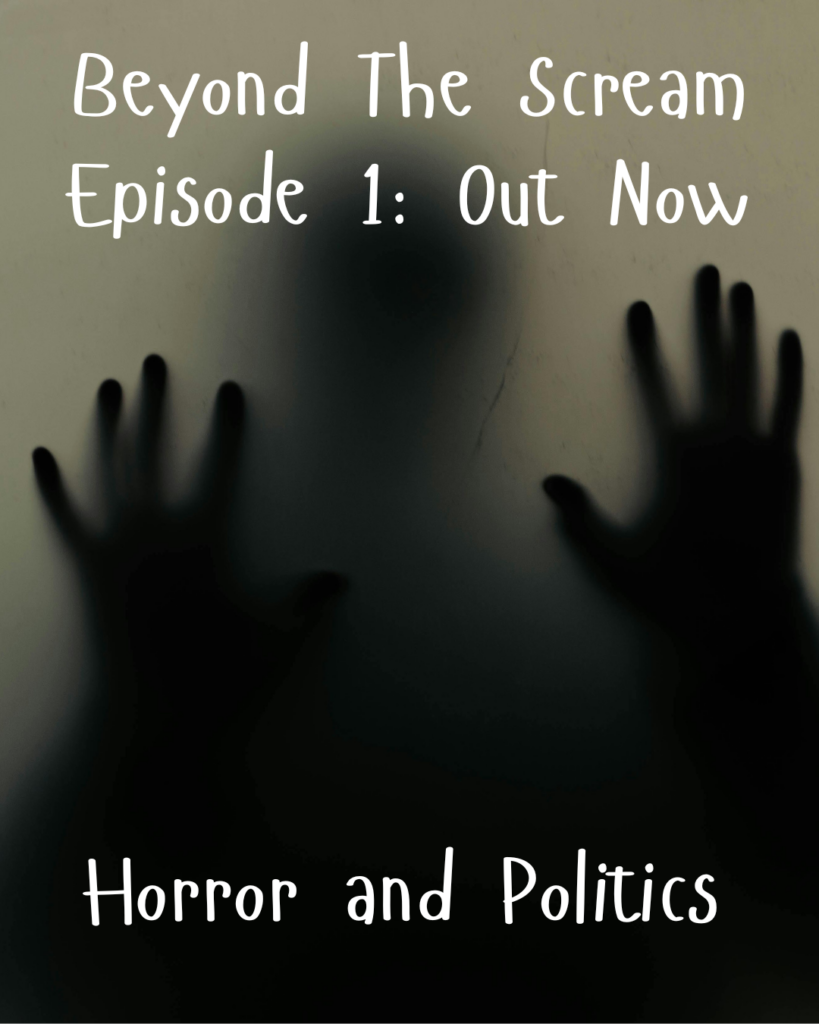On this episode of Beyond The Scream, Holden Duckworth takes a look into the politics of Horror movies between the separate terms of President Donald J. Trump. Beyond The Scream will take you into the depths of political and social commentary trends that present themselves within horror movies, and how they do it. This podcast takes an in-depth look at Get Out (2017) and Companion (2025) by talking about race, gender, and AI.
Beyond The Scream Episode 1
Think about your favorite movie, or the most recent one you enjoyed. What theme did you get from it? What was its message? Did it not have one?
Depending on your favorite film, this might come with a very clear or a very complicated answer. An action movie about war will handle this idea of messaging entirely differently than a romantic comedy.
So, how about horror, and thrillers? What message do you get from a creepy voice over the phone, or a summer camp slasher? The truth is: probably a very distinct and political one.
Hello, I am Holden Duckworth and welcome to Beyond the Scream.
Horror as a political concept in literature can go back as early as Mary Shelley’s Frankenstein in 1818. Then, in a full circle manner, in film it really started to take shape in the early 20s and 30s with the 1931 Frankenstein movie, and original 1922 Nosferatu. Both films utilized World War I anxieties about disease, science, and foreign influence.
So, what does all this mean? Horror and thriller, its sibling genre, has always been political on the screen.
Now of course, in 2025, the film industry has changed drastically and the media we consume does tend to be able to touch on more topics more openly. These two genres very openly now have political commentaries whereas the original Frankenstein and Nosferatu may not have. Still, even movies that tend to not have clear political opinions reflect the anxieties of society.
While Jason slashing teenagers at a Summer Camp may already be scary on its own, it reflects a fear of the new age of permissiveness in the younger generation. This exact anxiety might have been the reason that the final girl in the 80s tended to be more strictly moral than the rest of the cast.
So, this is how horror and thriller movies do it. They pick a social anxiety or aspect of society and exaggerate it into a scary creature or killer. It is believed that this is a decision due to trying to ground the film. That the audience may find it more scary if they can relate to something in the movie. A suburban audience may find a suburban movie scarier than an urban audience, and parents may worry more about the young teens on screen.
David Tinker, a Senior at University of Connecticut, and the president of the Husky Horror Club told me all about how he feels as a fan about how horror manages to get these politics on the screen in between the screams.
“It can be a particularly– it’s one of the best ways to look at the ambient culture of the society of when it is made because every horror film, no matter whether it is good or bad, is going to show you what the filmmakers thought would be scary particularly to a certain audience usually commercial audiences or mass audiences, and that can tell you a lot about the kind of fears that were going around in a society at a particular time or how people were thinking at that time.”
At any point, there is a political conversation that comes with fears and hopes. In 2025, the United States finds itself repeating a President Donald J. Trump as the 45th and 47th president. Why this is interesting is that one can see the different social anxieties that took a forefront during these two terms just by watching horror and thriller films.
In 2017, Trump was elected president for the first time and many may remember one topic more than any other: The Wall.
From the start of his presidency: immigration, race, and the economy with class took the forefront. It is not a coincidence that during his first term there was Ready Or Not, a movie about how the rich protect themselves, the series Lovecraft Country which saw monsters next to monstrous racism, His House with Sudanese Immigrants facing terrors in their refuge house.
Then, one movie stood out more than any other: Get Out.
Get Out was Filmmaker Jordan Peele’s directorial debut and we met with outstanding critical acclaim. It doesn’t shy away from its political messaging, bordering on the explicit side. Without heavy spoilers: Get Out is a movie about a black man who is visiting his white girlfriend’s family for the first time. The experience initially starts off as welcoming and warm, but strange interactions with other black people on the property leads him to believe something more sinister is going on. The movie, before even getting into the actual horror, unsettles the audience with microaggressions, control or a feeling of lack of autonomy, and racial bias. Very quickly in the movie, the audience is probably agreeing with the name.
Professor Hasenfratz, an English Professor at UConn who focuses on film, shared his ideas of politics in horror and how the audience may perceive it.
“I do feel like in gender politics– adolescents that have sex are the first ones to die in horror movies, and in a lot of horror movies there is a last victim who survives. So, it would be really easy for politics to be projected onto that.”
So how does this differ with 2025? Horror and thriller movies in 2024–25 seem to have similar trends as well, and they’re not the same. Now there is a focus on women and AI. One of the most obvious examples is AfrAId with the focus on AI in the middle, where AI turns killer. Megan as well does this similarly, but focuses on AI as a future companion and then once again turning killer. Then, there was Mother’s Instinct focusing on grieving mothers and a 1960 society.
This midcentury, suburban society has become quite the rising trend in horror and thrillers. This became a trend around the time of Roe V. Wade got overturned, with Don’t Worry Darling being one of the leading movies on this trend. Don’t Worry Darling being a movie about a housewife realizing the truth about her idyllic world and how much autonomy she has.
Now all of this sums up into one movie: Drew Hancock’s Companion. Companion is a highly rated film about an AI life-like Companion Doll used as a sort of fake girlfriend finding independence and autonomy, while accidentally getting into a lot of bloody trouble. While set in the present, the film styles the lead, Iris, in more vintage style clothing. This gives the movie a Stepford Wives feeling. This can very clearly reflect a political anxiety of not only AI overpowering and harming humans, but also women feeling controlled and not in charge of their own bodies due to legislation. These themes are not hidden from the audience, with one interesting scene where a woman confides in the AI that she is scared for future relationships if people could just buy their dream partner. In the span of the movie, audiences also see topics of queer people and violence against women.
While it may be too early to state that the themes presented in Companion will be trends for the next 4 years, I believe these are the trends that have the most force behind them and most clearly reflect some of the main social anxieties in the United States at the moment.
Once again, I am Holden Duckworth and this was Beyond The Scream.
Social Media Promos

